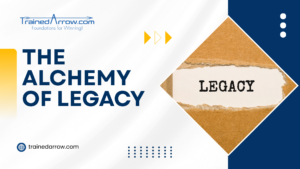
The Alchemy of Legacy … the soul-print we can leave in a fast-moving world!
In earlier times, life was simple. The past used to be with us. Families passed down not just names, but stories, values, and wisdom. The
![]()
A country’s ability to manage its debt justifies its certainty of growth. But that certainty often becomes a question as several variable forces that will ultimately influence the speed of the economic ascend or descend of that economy. As the public deficit becomes too big, then the degree of personal confidence declines, and we just need one key crisis to go faster down the spiral. True. It all depends on how the political establishment manages the situation – successful ‘quantitative easing’ among others. The United States is never free to act in a manner that disregards foreign investment, and so many other factors that help maintain its economy. Complicating matters is that the US has become more reliant on the global economy. Thus, we have citizens of this country listening to national policies that regardless of their impact will make decisions based on their own perceptions. Plus the greatest capability to talk into recession, call out a bear market and complain of dismal growth, and well, then SUFFER along!
But there are other ways to escape this. My point is beyond those statistical cascades – unemployment rate, profitability/dividends, inflation/stagflation, Foreign Direct Investments, etc., etc. It is also how we allow ourselves to be dependent on incremental profitability to eventually define the state of the economy and consequently make ourselves so vulnerable to suffer? True. It is important to have enough money to pay our bills, but do we ever learn that we cannot continue this path to drive our sense of security, the certainty of growth, and quality of life as a nation?
FIRST, the question is how in the US, we declare we are not growing or not being as successful (actually read suffering) as an economy. Japan, for example, does not use the same measures of success, as their priorities are more social than financial. Therefore, economic growth as measured in GDP is subservient to employment rates, income distribution, etc. Despite its drawn-out battles with their economic situations – real estate and financial market bubbles during the 90s, and deflationary pressures that persisted, unemployment in Japan has rarely risen above 5%. They also have huge domestic reserves owing to their ‘savings’ culture.
Americans, as consumers, on the other hand, have been gutted by decades of government and corporate policies that encourage spending and indebtedness. Whereas US assets are largely illiquid and leveraged. Some of this is a function of higher risk tolerances in the US, but it’s also a function of lack of awareness or careful thought and mainly ‘lack of contentment’ in as a way of life! For its people, “feeling good” holds a higher priority than being sensible when it comes to fiscal discipline. That combined with the notion that everyone is entitled to a better life irrespective of how it can be achieved has also placed the US in a position where it is being asked to underwrite the needs of a nation; a situation that cannot be sustained.
Americans read this approach as being ‘socialistic’ … and as such, some will consider this blog as having political overtones and not something of relevance. Nothing is further from the truth. In its simplest terms, the point that I am trying to make is how we define success. Is it something we strive for or is it something that we feel is a right? Are we easy to find contentment or are we willing to sacrifice for a better life? But the key difference I call out is ‘contentment’ in the criteria that define us being successful.
SECOND, the conundrum of how Americans see loss in the absence of gain. This view would suggest personal suffering when gains are little incremental (read growth) which is then exacerbated when corporate America begins lay-offs – call it downsizing, bear market, and effectively convinced all are LOSING. If capitalism means “riding on the money” – in another sense we can use money as our servant. However, in real terms, we are acting as slaves to money. Our desires are derived from wants and not needs. As such, the cost of these desires run ahead of earnings. As we project this trend into the future we compare existing income with future earnings and begin to worry if we see a shortfall. When will we realize that we don’t lose anything (in most situations) and avoid all the suffering? What it takes is a realistic view of the present and a reasonable expectation of the future.
I advocate capitalism. But I also advocate it with an understanding of contentment as a major factor when measuring returns. We can begin this path simply by exercising fiscal responsibility on both a personal as well as an organizational basis. Perhaps also ask Wall Street analysts to add “employee happiness” as a factor as well before they consider selling a company’s stocks off for not growing the profit numbers. As capitalists, let us also invest a half hour a day in spiritual life. Invest it any way possible – meditate for peace, pray for faith, sing with gratitude, dance for joy, and serve with love. It’s the best investment we can make. Then we will find both dividends and happiness together, and the rate of return to be infinite!

In earlier times, life was simple. The past used to be with us. Families passed down not just names, but stories, values, and wisdom. The
![]()

Okay, listen up. We’re all chasing the next big tech flex and the fastest quarterly win. But what happens when the founder retires, or the
![]()

Can you? Read this short story: A senior leader who once worked closely with the Reliance Group of India shared this story with me –
![]()
We are passionate about people development and transformation. Our courses are designed for: College Graduates, Corporate Employees, and Entrepreneurs. Interested?
trainedarrow@samprad.net
+1-609-658-3053